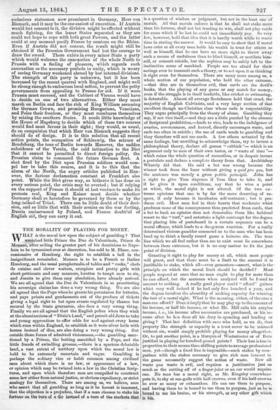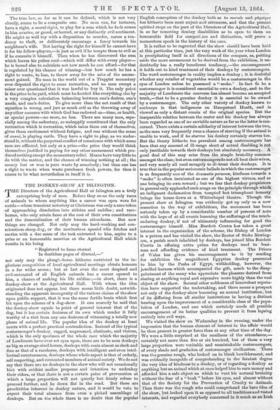THE MORALITY OF PLAYING FOR MONEY.
WHAT is the moral law upon the subject of gambling ? That wretched little Prince the Due de Valentinois, Prince de Monaco, after selling the greater part of his dominions to Napo- leon to be tyrannized over at discretion, has sold to M. Blanc, con- cessionaire of Homburg. the right to establish a hell in the insignificant remainder. Monaco is to be a French or Italian Homburg, and the usual paraphernalia of tables and " rooks," chefs de cuisine and clever waiters, croupiers and pretty girls with short petticoats and easy manners, lorettes to tempt men to sin, and Jesuits to give them easy absolution, have already arrived. We are all agreed that the Due de Valentinois in so prostituting his sovereign claims has done a very wrong thing. We are also all agreed that the Pope when he grants his permission for lotteries, and pays priests and gendarmerie out of the produce of tickets giving a legal right to bet upon events regulated by bhance but secured by the State guarantee, also does a very wrong thing. Finally we are all agreed that the English police when they wink at the abominations of " Dixie's Land," and permit old Jews to take and young apprentices to offer odds for and against every horse which runs within England, to establish as it were silver hells with horses instead of dice, are also doing a very wrong thing. But outside those forms of admitted viciousness,—the gambling sanc- tioned by a Prince, the betting sanctified by a Pope, and the little frauds of swindling grooms,—there is a spacious debatable land, a vast extent of territory upon which the moral law is held to be extremely uncertain and vague. Gambling is perhaps the solitary vice or habit common among civilized men about which there is no law, or appearance of a law, or opinion which may be twisted into a law in the Christian Scrip- tures, and upon which therefore men are compelled to construct some law either from natural justice, or obvious expediency, or strict analogy for themselves. There are among us, we believe, men who assert that all gambling so long as it be honest is innocent, that the objection is a prejudice, that if a man chooses to stake his fortune on the turn of a die instead of a turn of the markets that is a question of wisdom or judgment, but not in the least one of morals. All that morals enforce is that he shall not stake more than his fortune, shall not bet trusting to win, shall not play cards for sums which if he lost he could not immediately pay. So very few, however, hold that idea that it is hardly worth while to waste time in stating the answer. It would be easy to show that if moral laws exist at all every man bolds his wealth in trust for others as- well as himself, that he can have no more right to throw away such a means of usefulness than to blind himself, or mutilate him- self, or commit suicide, but the sophism may be safely left to the instinctive sense of mankind. People are too afraid for their- savings ever to transmit such a theory, or to act upon it as thinking it right even for themselves. There are many more among us, a whole section of our population, who hold the other extreme,-- -that dice are in themselves evil, that cards are the devil's - books, that the playing of any game or any match for money, - even if the struggle is in itself laudable, like cricket or swimming, is detestable. Almost all average Scotchmen hold that creed, the- majority of English Calvinists, and a very large section of that excellent though un-Christian class whose code is respectability. They argue principally from the theory of abuse. Gambling they say, if not vice itself,—and they are a little puzzled by the absence of Scriptural prohibition,—leads to vice, leads to the indulgence of avarice, covetousness, and hatred, directly encourages waste, and ends too often in suicide ; the use of cards tends to gambling and they therefore will not use cards. A few others actuated by the same feelings, but unwilling to acknowledge them, try to invent a philosophical theory, declare all games " rubbish"— which is an argument only to men of their own tastes, or " waste of time "- which raises the whole question of recreation, or in despair invent a postulate and deduce a complete theory from that. Archbishop Whately did that. He said a bet was wrong because the winner took from the loser without giving a quid pro quo, but the sentence was merely a gross patio principii. John has a right to give Tom sixpence if Tom likes to take it, and if he gives it upon conditions, say that he wins a point at whist, the moral right is not altered. Of the two ex- treme opinions that one is by far the more deserving of re- spect, if only because it inculcates self-restraint ; but it pro- duces evil. Most men feel in their hearts that moderate whist produces none of the consequences thus predicted from cards, that a bet to back an opinion does not demoralize them like habitual resort to the " turf," and entertain a light contempt for the dogma that placing bits of pasteboard in a certain sequence can be a. moral offence, which leads to a dangerous reaction. For a really- determined vicious gambler commend us to the man who has bee,n. bred up to think a family round game a heinous sin. The true line which we all feel rather than see to exist must lie somewhere between these extremes, but it is no easy matter to fix the lust point of division.
Granting it right to play for money at all, which most people will grant, and that there must be a limit to the amount it is justifiable to stake, which all—even gamesters—assert, what is the- principle on which the moral limit should be decided? Most- people respond at once that no man ought to play for more than. he can afford, but the sentence when analyzed will be found to amount to nothing. A really good player could " afford" guinea whist very well indeed if he had only five hundred a year, and the dogma involves the absurdity of making capacity for winning the test of a moral right. What is the meaning, either, of the sum a man can afford? Does it imply that he may play up to the amount of his income, or half his income, or what Mr. Mill calls his surplus income, i. e., his income after necessaries are purchased, or his in- come after he has done all his duty in spending and lending or giving? That last definition with men who hold, as we do, that property like strength or capacity is a trust never to be misused without sin, would simply prohibit playing for money altogether. Or, to put another point, is a Marquis of Westminster or of Bute justified in playing for hundred-pound points ? Their loss is less in proportion to their means than shilling points to average professional men, yet—though a fixed line is impossible—such stakes by com- parison with the stakes necessary to give rich men interest in the game necessarily suggest the notion of waste. Now all waste qua waste is evil, and requires a justification just as much as the cutting off of a finger-joint or an ear would require one. No man has a moral right, as Mr. Kingsley somewhere puts it, to shy at sea-gulls with half-crowns, even if his half-crowns be ever so many or exhaustless. He can use them to purpose, and having them he is bound to use them to purpose, just as he is bound to use his brains, or his strength, or any other gift which is his. The true law, so far as it can be defined, which is not very closely, seems to be a composite one. No man can, for instance, have a right, a moral right, to play for a sum which he feels rouses in him avarice, or greed, or hatred, or any distinctly evil sentiment. He might as well toy with a disposition to murder, caress a ten- dency to theft, or deliberately encourage a fancy towards his neighbour's wife. Not having the right for himself he cannot have it for his fellow-players,—is just as evil if he tempts them to evil as if he commits it himself. Then when he has discovered the sum which leaves his pulses cool—which will differ with every player— he is bound also to calculate not bow much he can afford—for that is regulated by his chance of winning—but how much he has a right to waste, to lose, to throw away for the sake of the amuse- ment gained. No man in the world out of a Trappist monastery ever disputed the right to some recreation, and no man except a miser ever questioned that it was lawful to buy it. The only point is the price to be paid, which must be decided like everything else by a very complex calculation balancing between one's desires, one's needs, and one's duties. To give more than the net result of that equation is wrong, and just as much evil as the throwing away of any other resource with which God has endowed us—time, or health, -or special powers—no more, no less. There are many men, espe- cially among the sedentary, so unhappily constituted that the only recreation which is recreation, which takes them out of themselves, gives them excitement without fatigue, and rest without the sense of ennui, is playing cards. They have a right to play, as we under- stand it, without the perpetual conflict of conscience with which some men are afflicted, but only at a price—the price they would think themselves justified in_ paying for any other amusement which pro- duced nothing except the momentary relief. Means have very little to do with the matter, and the chance of winning nothing at all ; the money lost or won is pure waste by somebody; but then one has a right to waste when waste purchases fresh powers, for then it ceases to be what nevertheless in itself it is.































 Previous page
Previous page